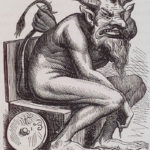My Minimally Invasive Style of Literary Transation
I translate Italian literature into modern English. I have translated several small and medium-sized works and a few large ones. I am working on several long-term projects, including the Decameron of Giovanni Boccaccio and The Prince and other selected works of Machiavelli. Most of my translations from Italian are listed under the Italian tab on this site. I also translate a little from French and some of that is under the French tab.
I think of my style of literary translation as “minimally invasive” meaning that my job is to make the author’s text accessible to English readers as plainly and directly as I can. I prefer to translate as clearly as I can, without embellishing or restyling. I strive to deliver the language and imagery of the original, with respect for the author’s style and intent.
As a translator, I am practicing two skills. The first one is my ability to understand the original text. The second skill is my ability to use my own language, artistically or technically, in service to the original author and to the readers.
Some translators compare this work to building a bridge. As a metaphor of physical space I consider it more like building a parallel location for the readers to leap into and visit by any means of conveyance. The various translations posted under the Italian and French tabs on this site are examples of how this works for me.
This is also my approach for translating anything, such as a contract, some engineering specs, a medical text or a software interface.
Rhyme or Meter?
When translating poetry that rhymes, I may put rhymes into my translation, if I am able to find them (as I did here, in the first two stanzas of Gaspara Stampa’s seventh sonnet). Usually, I will not find rhymes so easily and I prefer not to manipulate the translation just to produce rhymes. I prefer to translate into blank verse, which allows me to write for meter without regard for rhyme. This also lets me stay closer to the original language. I prefer to respect the author’s imagery and choice of words, rather than to have to change that simply in order for the translation to produce rhymes. An example of this is my translation of Michelangelo’s sonnet XVII in comparison to another translation done over 100 years ago (on the same page).
Comparing Translations
It is great fun to compare translations, to get a taste of each one’s qualities. Sometimes we can hear the language as spoken and written in the translator’s time. Occasionally a translator deliberately uses a more antique language. Some translations sound dated, bearing the signs of the author’s time or affectations. Sometimes a careful reader can spot a place where a translator did not understand the text, or may laugh at a poor or clumsy translation.
What Makes a Good Final Product
I strive for smooth and clear modern English and I also try to use as much as possible the original author’s phrasing, prose rhythm, imagery and vocabulary. Of course, the finished product must still read as clear English. If it follows the original text too slavishly, without regard to good style, it risks failing the test of being a good read. That is the last test of the final product.
When it comes to translating a play, such as La Mandragola, the “good read” test is also subject to the test of whether the language will sound natural when spoken on stage. A bad translation can be a barrier to enjoyment and to understanding the play. I will withhold, for now, one awful example of that.
I find that I can express the content of the original, to my own satisfaction, in a way that respects the text. This is also a gesture of respect for my readers, as I am not going to stand in the way between them and the original author. Instead, my role is only to facilitate their understanding of the text. I hope that readers and audiences hear their own language in these translations, and also still get the flavor and something of the style of the original.
Translations Completed and In Progress
 Niccolò Machiavelli, Favola di Belfagor arcidiavolo – The Fable of Belfagor the Archdevil
Niccolò Machiavelli, Favola di Belfagor arcidiavolo – The Fable of Belfagor the Archdevil
I have translated the novella and also adapted it for the stage into a five-act play. Here is my translation of the novella. The play is complete and will be published simultaneously in English and Italian in the Spring of 2020.
The story is that the devils in charge of Hell learn that the souls of many newly arrived men blame their wives for their damnation. They decide to send an emissary up into the world to investigate what is ‘matrimony’ and Belfagor is chosen to go. After a comical and dramatic chain of fortunes and misfortunes, Belfagor flees back to Hell rather than live another day under his wife’s rule.
Niccolò Machiavelli, La Mandragola or The Mandrake
La Mandragola is known as the greatest play of the Renaissance and one of the first original modern comedies. It was a hit in the private performances that it received several times during Machiavelli’s life. Written almost 100 years before “Shakespeare” and 150 years before Molière, it bears well the comparison to either of them. I find it remarkable that La Mandragola has some characteristics that are at the same time, quite medieval and also strikingly modern.
La Mandragola is the story of a wealthy young man who manages to win the love of a woman who is married to a dull-witted older man, with the husband’s unwitting assistance and that of a crew of co-conspirators including the young man’s servant, a conniving friend, a corrupt priest and the woman’s own mother. The male characters conduct most of the action but they are fools; there are three female roles which are shorter but hold the keys to the story.
Niccolò Machiavelli, The Prince
The Prince is already a bestseller. With so many translations of The Prince in circulation, why should I add my Prince to the pile? The first reason is that there are several translations that are so unreadable that I wonder how they were ever done, let alone published. I find that the portions that I have translated so far are clearer and more readable than many other translations I’ve seen. Another reason to translate The Prince is that it is his most popular work and for me to sell an edition of Machiavelli’s works, The Prince has to be in the book. In addition to that, the popularity of The Prince means it is important to attracting web traffic on Machiavelli. This is a work in progress which I hope to finish in 2020.
Niccolò Machiavelli, selected verses
His comic verses add depth to the picture of Machiavelli as a humorist and satirist and they help us understand the complete man who is otherwise only known for his thoughts on history, diplomacy and politics.
Giovanni Boccaccio, Decameron (selected novellas)
It will take years to translate all 100 of the stories in The Decameron, so I am taking some of my favorites, one at a time, slowly. So far I have finished 4 novellas, just 96 more to go! Here is the link to one of them, find the others under the Italian tab in the navigation here.
Gaspara Stampa, Rime
She is for many readers the greatest woman poet of the Italian Renaissance. Her 311 poems called “Rhymes” or “Rime” in Italian, collected and published posthumously by her older sister, form a deeply personal and revealing autobiography. Here are the first two that I have completed.
Lorenzo de Medici, Song of Bacchus / Canzone di Bacco “Chi vuol esser lieto, sia…”
Lorenzo’s famous lyric celebrating youth and happiness summarizes the spirit of the high renaissance in Florence, where Machiavelli grew up and was educated.
Michelangelo Buonarotti, Sonnets
Michelangelo was a skillful poet in addition to his genius as a painter, sculptor and architect. Some of his sonnets describe his thoughts about the art of sculpture, some are dedicated to his dear friend Vittoria Colonna while others celebrate his religious faith. My translation of this sonnet is published here with a comparison to an older translation.
Vittoria Colonna, Sonnets
Some of the verses that she wrote to her friend Michelangelo reveal their close friendship.
Pietro Aretino, (selections) Lettere e Sonnetti
Aretino was a courtier, author, poet and blackmailer, a nasty man for nasty times. He wrote many forms of prose and poetry including some very naughty sonnets.

Raphael, La madonna sistina (detail), Vatican Museum.
